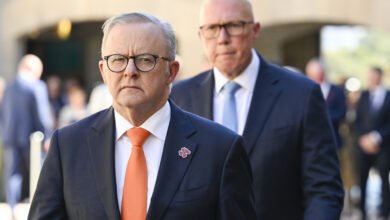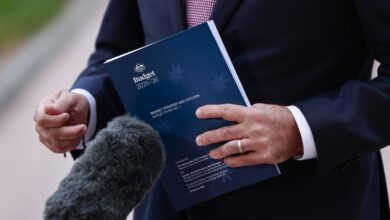Budget cuts slash graduate intake
Final year students rally over cuts to Tasmania's graduate nurse intake, Linda Belardi reports.
One-third of Tasmania's annual graduate nurse intake has been slashed, due to public cost cutting.
The Tasmanian Minister for Health, Michelle O'Byrne announced a 2012 employment intake of up 98 positions, down from 150 in the previous year.
The move follows the government's decision to freeze its annual recruitment campaign for October.
The Australian Nursing Federation Tasmanian branch secretary, Neroli Ellis, said students were angry about the lack of certainty and 50 students had rallied outside Parliament House on September 24 to protest the government's handling of the program. The ANF Tasmania has also organised a petition and arranged meetings with both the minister and her department.
Ellis, said the move will force the graduates to consider alternative career paths at a time when Tasmania faced a state-wide shortfall in nurses.
The Royal Hobart Hospital, the major tertiary hospital in Tasmania, is filling only half their normal number of positions, she said. "There's no way any graduate can afford to wait around - they're going to have to move on with their careers or opt out of nursing."
"This notification came to them too late. The department first wrote to them on September 7, which is after the other states had closed their graduate program application process," she told Nursing Review.
The deferral has also resulted in disruptions to the formal induction process to support graduate nurses. "It will now be a bit of a 'hodge-podge' program, where people will be coming in and out at different time frames, without any consistency of support or formal induction," said Ellis.
Graduate nurses seeking positions can now apply to a recruitment register to be established by the Department of Health and Human Services.
The ANF said the reduced number of places will compromise the ability of the health sector to deliver services. "They are cutting out 22 funded graduate positions, which will have a significant impact on direct frontline delivery."
Ellis said the annual 150 intake was based on the required number of nurses needed to replace the state's ageing nursing workforce. "This is based on the rate of retirement over the next five years and these are the numbers needed to provide a sustainable workforce."
The government said it had undertaken careful workforce planning and would offer graduates part-time or flexible options, where possible.
It would also make use of its workforce renewal programs to offer new positions to graduates made vacant from retiring nurses.
However, the ANF said graduate nurses were yet to benefit from these openings. "The 10 nurses from the first round of that renewal program have not been replaced at this stage and certainly not replaced with graduates."
O'Byrne acknowledged it had been a difficult time for nurse graduates but said the department had to make budget savings. "The decision is clearly in response to our current budget deficit crisis that is just about cutting divisions and cutting the budget," said Ellis.
Professor Ray Playford, dean of the faculty of health science at the University of Tasmania, declined to be interviewed for this story. However, Playford said in a statement that the university prepared its nursing graduates to work in any state or territory and internationally.
"In fact, many nurses leave Tasmania for at least part of their career to work in other states and other countries, such as the UK, where they are welcomed."
Ellis said the union was disappointed that the state's only university did not engage in the ongoing workforce issues affecting its graduates.
Email: [email protected]




